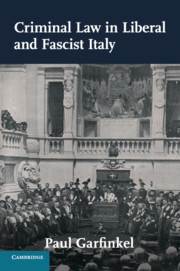Crossref Citations
This Book has been
cited by the following publications. This list is generated based on data provided by Crossref.
Pires Marques, Tiago
and
Ribeiro, Tiago
2017.
Future Perspectives on Crime Control Under 20th Century Authoritarian Regimes.
Crime, Histoire & Sociétés,
p.
105.
Montaldo, Silvano
2018.
Lombroso: The Myth,The History.
Crime, Histoire & Sociétés,
p.
31.
Dunnage, Jonathan
2018.
The Work of Cesare Lombroso and its Reception: Further Contexts and Perspectives.
Crime, Histoire & Sociétés,
p.
5.
Musumeci, Emilia
2018.
Against the Rising Tide of Crime: Cesare Lombroso and Control of the “Dangerous Classes” in Italy, 1861-1940.
Crime, Histoire & Sociétés,
p.
83.
Campesi, Giuseppe
and
Fabini, Giulia
2020.
Immigration Detention as Social Defence: Policing ‘Dangerous Mobility’ in Italy.
Theoretical Criminology,
Vol. 24,
Issue. 1,
p.
50.
Lobban, Michael
2021.
Imperial Incarceration.
Auerbach, Sascha
2021.
Armed with Sword and Scales.
Elbek, Laust Lund
2022.
Rupture, reproduction, and the state: The Arab Spring on Lampedusa as ‘Layered Event’.
History and Anthropology,
Vol. 33,
Issue. 5,
p.
652.
Slavković, Vukian
2023.
The Doctrine of Provocation Defence and a Murder Based on Jealousy.
Teisė,
Vol. 127,
Issue. ,
p.
159.
Ravelli, Galadriel
2024.
Libyan deportees on the Italian island of Ustica: Remembering colonial deportations in the (peripheral) metropole.
Memory Studies,



